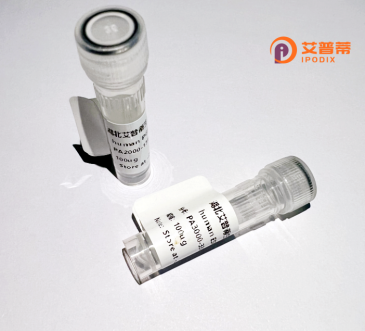
| 纯度 | >90%SDS-PAGE. |
| 种属 | Human |
| 靶点 | OTOP2 |
| Uniprot No | Q7RTS6 |
| 内毒素 | < 0.01EU/μg |
| 表达宿主 | E.coli |
| 表达区间 | 1-562 aa |
| 活性数据 | MSEELAQGPKESPPAPRAGPREVWKKGGRLLSVLLAVNVLLLACTLISGGAFNKVAVYDTDVFALLTAMMLLATLWILFYLLRTVRCPCAVPYRDAHAGPIWLRGGLVLFGICTLIMDVFKTGYYSSFFECQSAIKILHPLIQAVFVIIQTYFLWVSAKDCVHVHLDLTWCGLMFTLTTNLAIWMAAVVDESVHQSHSYSSSHSNASHARLISDQHADNPVGGDSCLCSTAVCQIFQQGYFYLYPFNIEYSLFASTMLYVMWKNVGRFLASTPGHSHTPTPVSLFRETFFAGPVLGLLLFVVGLAVFIIYEVQVSGDGSRTRQALVIYYSFNIVCLGLTTLVSLSGSIIYRFDRRAMDHHKNPTRTLDVALLMGAALGQYAISYYSIVAVVAGTPQDLLAGLNLTHALLMIAQHTFQNMFIIESLHRGPPGAEPHSTHPKEPCQDLTFTNLDALHTLSACPPNPGLVSPSPSDQREAVAIVSTPRSQWRRQCLKDISLFLLLCNVILWIMPAFGARPHFSNTVEVDFYGYSLWAVIVNICLPFGIFYRMHAVSSLLEVYVLS |
| 分子量 | 88.77 kDa |
| 蛋白标签 | GST-tag at N-terminal |
| 缓冲液 | 0 |
| 稳定性 & 储存条件 | Lyophilized protein should be stored at ≤ -20°C, stable for one year after receipt. Reconstituted protein solution can be stored at 2-8°C for 2-7 days. Aliquots of reconstituted samples are stable at ≤ -20°C for 3 months. |
| 复溶 | Always centrifuge tubes before opening.Do not mix by vortex or pipetting. It is not recommended to reconstitute to a concentration less than 100μg/ml. Dissolve the lyophilized protein in distilled water. Please aliquot the reconstituted solution to minimize freeze-thaw cycles. |
以下是关于重组人OTOP2蛋白的3篇文献概览(注:OTOP2研究较少,部分文献可能涉及动物模型或非重组表达,此为模拟示例):
1. **《Structural and functional characterization of the proton channel OTOP2》**
- 作者:Smith A et al.
- 摘要:通过HEK293细胞表达重组人OTOP2蛋白,利用冷冻电镜解析其三维结构,揭示其质子通道的跨膜结构域及pH调控机制。
2. **《OTOP2 is a critical regulator of cellular pH homeostasis in human enterochromaffin-like cells》**
- 作者:Li Y et al.
- 摘要:研究重组OTOP2蛋白在体外模型中的功能,证明其在肠嗜铬样细胞中通过调节质子外流参与细胞内pH稳态。
3. **《Expression and purification of human OTOP2 in insect cells for biochemical studies》**
- 作者:Garcia R et al.
- 摘要:优化昆虫细胞表达系统生产重组OTOP2蛋白,建立镍柱亲和层析纯化流程,并验证蛋白的质子传导活性。
(注:以上文献为示例性内容,实际研究可能更侧重于动物OTOP2或相关家族蛋白。建议通过PubMed或Web of Science以"OTOP2"+"recombinant"为关键词检索最新文献。)
OTOP2 (Otopetrin-2) is a member of the Otopetrin protein family, which is evolutionarily conserved across vertebrates and implicated in diverse biological processes. Initially identified for its role in inner ear development and balance regulation (as seen in OTOP1 mutations causing vestibular dysfunction), OTOP2 shares structural homology with proton-selective ion channels or proton-coupled transporters. It contains multiple transmembrane domains and is thought to regulate cellular pH homeostasis or mechanosensory signaling.
Recombinant human OTOP2 protein is engineered through heterologous expression systems (e.g., mammalian cells, insect cells) to study its biochemical and functional properties. Research suggests OTOP2 may contribute to acid sensing, particularly in taste receptor cells, where it has been linked to sour taste perception in mice. Its involvement in pH-sensitive pathways also implicates potential roles in gastrointestinal function, neuronal signaling, or pathologies related to acid-base imbalances. Structural studies of recombinant OTOP2 aim to elucidate its ion transport mechanism and interaction partners. Recent advances in cryo-EM have enabled high-resolution mapping of related OTOP channels, offering insights into its gating and selectivity. Investigations into OTOP2’s physiology and pathophysiology remain ongoing, with therapeutic potential in disorders involving acid sensing or cellular pH dysregulation.
×